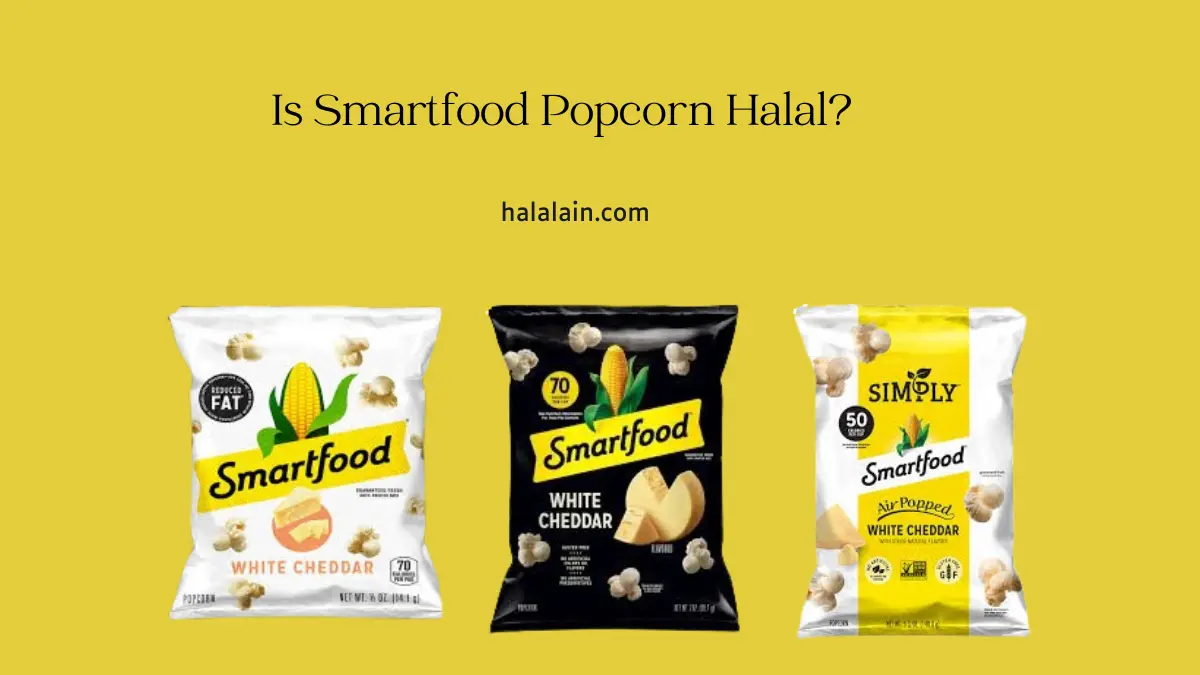For many Muslims, ensuring that their food consumption adheres to halal standards is of utmost importance. Halal, which means “permissible” in Arabic, refers to what is allowed under Islamic law. This extends beyond the types of food to include the manner of their preparation. With the rising popularity of snack foods like Smartfood popcorn, a common question that arises is: “Is Smartfood popcorn halal?” In this blog post, we will delve into the ingredients of Smartfood popcorn, analyze its halal status, refer to Quranic and Hadith teachings, explore the benefits of eating halal, and offer halal alternatives.
Introduction of Smartfood Popcorn
Smartfood popcorn is a popular snack brand known for its variety of flavors and convenience. Launched in 1985, Smartfood quickly gained a reputation for its delicious and unique flavors, particularly its signature White Cheddar Cheese popcorn. Today, Smartfood offers a wide range of flavors including Sea Salt, Movie Theater Butter, and even sweeter varieties like Caramel and Cinnamon.
Ingredients of Smartfood Popcorn
To determine whether Smartfood popcorn is halal, it’s crucial to examine its ingredients. Here’s a breakdown of the ingredients in some of the most popular Smartfood flavors:
White Cheddar Cheese Popcorn:
- Popcorn
- Vegetable Oil (Corn, Canola, and/or Sunflower Oil)
- Cheddar Cheese (Milk, Cheese Cultures, Salt, Enzymes)
- Whey
- Buttermilk
- Natural Flavor
- Salt
Sea Salt Popcorn:
- Popcorn
- Vegetable Oil (Corn, Canola, and/or Sunflower Oil)
- Sea Salt
Movie Theater Butter Popcorn:
- Popcorn
- Vegetable Oil (Corn, Canola, and/or Sunflower Oil)
- Butter (Cream, Salt)
- Salt
- Natural Flavor
- Annatto Extract (for Color)
Caramel and Cinnamon Popcorn:
- Popcorn
- Brown Sugar
- Butter (Cream, Salt)
- Corn Syrup
- Salt
- Natural Flavor
- Baking Soda
- Cinnamon
Is Smartfood Popcorn Halal?
The halal status of Smartfood popcorn hinges on the specific ingredients used and their sources. Let’s examine the key components that could affect its halal status:
Cheese and Dairy Products:
The cheese and dairy products in Smartfood popcorn (such as Cheddar Cheese and Butter) must come from halal sources. Cheese often contains enzymes, and if these enzymes are derived from animal sources, they must come from animals slaughtered according to halal guidelines.
Natural Flavors:
“Natural flavors” can be ambiguous as they can be derived from both plant and animal sources. For a product to be halal, these flavors must come from halal-certified sources.
Oils:
The vegetable oils used are typically halal as they are derived from plant sources.
Additives and Preservatives:
Other additives like baking soda, salt, and annatto extract are generally considered halal.
Given the ingredient list, it is advisable for Muslims to seek out a halal certification on the packaging or contact the manufacturer directly to confirm the halal status of specific Smartfood products.
References to Quran and Hadith
The consumption of halal food is emphasized in both the Quran and Hadith. Here are some relevant references:
Quran:
- “O you who have believed, eat from the good things which We have provided for you and be grateful to Allah if it is [indeed] Him that you worship.” (Quran 2:172)
- “They ask you, [O Muhammad], what has been made lawful for them. Say, ‘Lawful for you are [all] good foods and [game caught by] what you have trained of hunting animals which you train as Allah has taught you. So eat of what they catch for you, and mention the name of Allah upon it, and fear Allah.'” (Quran 5:4)
Hadith:
- “The Halal is clear and the Haram is clear; in between these two are certain things that are suspected (doubtful) which many people do not know whether they are Halal or Haram.” (Sahih Bukhari)
- “Verily, Allah has prescribed proficiency in all things. Thus, if you kill, kill well; and if you slaughter, slaughter well.” (Sahih Muslim)
Benefits of Halal Consumption
Consuming halal food is not only a religious obligation but also comes with several benefits:
Health Benefits:
Halal foods are often cleaner and more hygienic, as they must be free from contaminants and harmful substances. The process of halal slaughter also ensures that the blood is thoroughly drained from the animal, which can reduce the risk of bacterial contamination.
Ethical Treatment:
The halal method emphasizes the humane treatment of animals, ensuring they are well-fed, healthy, and treated with kindness.
Spiritual Benefits:
Consuming halal food aligns with Islamic teachings, fostering a sense of spiritual well-being and fulfillment.
Halal Alternatives to Smartfood Popcorn
For those seeking halal-certified alternatives to Smartfood popcorn, several brands and options are available:
Halal-Certified Popcorn Brands:
- Popcornopolis: Known for its variety of flavors and halal certification.
- GH Cretors: Offers a range of gourmet popcorn flavors with halal certification.
Homemade Popcorn:
Making popcorn at home can be a simple and enjoyable alternative. By using halal-certified ingredients, you can ensure the snack is halal. Here’s a quick recipe:
- Ingredients: Popcorn kernels, vegetable oil, salt, halal-certified cheese powder or other flavorings.
- Instructions: Heat the oil in a large pot over medium heat, add the kernels, cover the pot, and shake occasionally until popping slows. Season with salt and halal flavorings.
Opinions of Scholars
Islamic scholars often provide guidance on contemporary issues, including food consumption. Different scholars may have varying opinions based on their interpretations of Islamic law. Some scholars might deem Smartfood Popcorn halal if the questionable ingredients are verified as halal, while others might advise caution and avoidance if there is any doubt about the sources of those ingredients.
For instance, scholars from organizations like the Islamic Food and Nutrition Council of America (IFANCA) or the Halal Monitoring Committee (HMC) provide certifications and can be a reliable source for halal status verification. Consulting with such organizations can provide clarity on the halal status of Smartfood Popcorn.
Summary
In summary, determining whether Smartfood popcorn is halal involves closely examining its ingredients and their sources. While some components like vegetable oils are typically halal, others such as cheese and natural flavors require further verification. Muslims are encouraged to look for halal certifications or contact manufacturers for confirmation. Consuming halal food is integral to maintaining both physical health and spiritual well-being.
Frequently Asked Questions
Q1: Is Smartfood White Cheddar Popcorn halal?
- A: It depends on the source of the cheese and natural flavors. It’s best to seek halal certification or contact the manufacturer.
Q2: Can Muslims eat Smartfood Sea Salt Popcorn?
- A: Sea Salt Popcorn is more likely to be halal, but verifying the source of the oil used is advisable.
Q3: Are there halal alternatives to Smartfood Popcorn?
- A: Yes, brands like Popcornopolis and GH Cretors offer halal-certified popcorn. You can also make homemade popcorn with halal ingredients.
Q4: What should I look for in halal snacks?
- A: Ensure that all ingredients are halal-certified, especially flavorings, dairy products, and additives.
Q5: Why is it important to consume halal food?
- A: Consuming halal food is a religious obligation for Muslims, ensuring health, ethical treatment of animals, and spiritual well-being.
By following these guidelines and seeking halal-certified products, Muslims can enjoy snacks like popcorn while adhering to their dietary laws.

